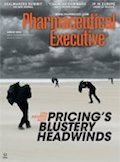On and Off the Pharma Podium
Pharmaceutical Executive
In the spirit of the Olympics, we cite some of the feel-good and not-so-good stories making waves in the competitive world of pharma.
In spite of the hullabaloo around the Summer Olympics’ many blemishes and potential disasters-corruption, doping, sewage-defiled waterways, Zika, etc.-we can’t help but get into the spirit of friendly international sportsmanship, national anthems and pomp.

Gold and silver to Bayer and J&J
The Olympic brand could be at an all-time low. But if corporate “BrandPower” were an event, top awards would be handed out to Bayer and J&J for the strong top 10 finish in Tenet Partners’ rankings. The metric is a bit like a decathlon, scoring each company in different events like familiarity and favorability as well as reputation and “ability to impact business performance.” Bayer and J&J (at #3 and #8, respectively) are situated with other kings of the global corporate world, Coca-Cola, Hershey, Walt Disney, Apple, Microsoft, PepsiCo, American Express and Google – Alphabet. Bristol-Myers Squibb also cracked the biopharma brand podium, placing 78th on the overall list.
Shire wins a pair
Shire could earn gold for winning approval with Xiidra (lifitegrast) in dry eye, an exceedingly challenging indication that hadn’t seen a new product enter the market since Allergan’s Restasis, over a decade ago. Leaping over the FDA’s requirements to display improvement in both signs and symptoms had proven a high hurdle for others developing treatments in an underappreciated affliction that can severely impact patients’ quality of life, but for which clinical evidence proved tenuous with nebulous measurements and complicating factors like weather and allergies.
A second gold could come for Shire’s pricing strategy that might keep it on the fringe of #DrugPricing debates and headlines. The $5,000 per year matches up with Restasis, a targeted shot to gain share of Allergan’s $1 billion-plus market.
A comeback worthy of silver
Written off by AstraZeneca and Amgen, Valeant could earn laurels for its risk-taking on psoriasis treatment brodalumab. Six suicides in clinical trials had developers sprinting away, though the mechanistic connection had many scratching their heads. Valeant took over the heavy lifting, and approval looks likely with the unanimous backing of an FDA advisory committee panel. A black box warning, however, will keep it several lengths out of first, a spot that will certainly be kept by Cosentyx, the first IL-17 antibody to market by Novartis-a drug class that had dermatologists thrilled upon seeing clinical data.
Wearable bronze
GlaxoSmithKline, along with Medidata and POSSIBLE Mobile, earned a podium spot for their team effort in rheumatoid arthritis (RA). The group is diving into a wearables trial with Apple Research Kit to gain a real-world look into patients’ lives, and RA seems like an ideal arena for movement-tracking technologies to set a new research pace. The PARADE study (Patient Rheumatoid Arthritis Data from the Real World) won’t be testing a specific drug. We’ll reserve the top podium spots for efforts that will bring wearable tech to actual pivotal drug trials, which hopefully won’t be far off.
Bronze brain training?
As drug efforts remain off the awards stand, data at this year’s Alzheimer’s Association International Conference saw previously disallowed brain-training games with results worthy of a medal. Researchers seem pleasantly surprised that relatively minor interventions via computer-based games had significant impacts a decade later-and even demonstrated a typically meaningful dose-response. The disqualification of app-based brian trainers like Lumosity may still be in effect, though with few other promising entrants out there, we look forward to seeing more digital interventions attempted.
Did not finish
In the always contested field for obesity treatments, disappointments continue as Zafgen tossed its candidate beloranib into the mucky waters. The company will regroup around its second-generation MetAP2 inhibitor that it says has shown similar efficacy and better safety, in mice. With any luck, maybe Tokyo in 2020 will have a stronger field of players. For now, your best chances to look like an Olympian is to train like one.

Casey McDonald
is
Pharm Exec
’s Senior Editor. He can be reached at
casey.mcdonald@ubm.com
and on Twitter at
@mcd_casey

Addressing Disparities in Psoriasis Trials: Takeda's Strategies for Inclusivity in Clinical Research
April 14th 2025LaShell Robinson, Head of Global Feasibility and Trial Equity at Takeda, speaks about the company's strategies to engage patients in underrepresented populations in its phase III psoriasis trials.
Beyond the Prescription: Pharma's Role in Digital Health Conversations
April 1st 2025Join us for an insightful conversation with Jennifer Harakal, Head of Regulatory Affairs at Canopy Life Sciences, as we unpack the evolving intersection of social media and healthcare decisions. Discover how pharmaceutical companies can navigate regulatory challenges while meaningfully engaging with consumers in digital spaces. Jennifer shares expert strategies for responsible marketing, working with influencers, and creating educational content that bridges the gap between patients and healthcare providers. A must-listen for pharma marketers looking to build trust and compliance in today's social media landscape.
Pfizer, GSK Gain ACIP Recommendations for RSV and Meningococcal Vaccines
April 18th 2025The Centers for Disease Control and Prevention’s Advisory Committee on Immunization Practices voted to expand access to Pfizer’s respiratory syncytial virus vaccine Abrysvo for high-risk adults in their 50s and voted in favor of GSK’s meningococcal vaccine, Penmenvy, for streamlined adolescent protection.